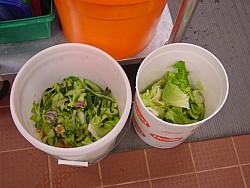July 30, 2013
This latest installment in our ongoing NERC Blog series on organics management presents tips for implementing organics recycling for commercial food scrap generators.
|
As with organics reduction efforts and home composting, education and training are required for success. A wide range of Internet resources on how to promote commercial organics recycling are available for municipal staff or volunteers to assist in training commercial generators. |
Commercial organics diversion presents another low cost organics management opportunity for rural and small towns, particularly offering a focus on diversion of food scraps. Commercial organics recycling is typically implemented if off-site commercial or farm composting is available, or if commercial generators are permitted to use municipal composting sites.
Businesses may benefit from lower composting collection fees, reducing disposal costs while being environmentally and socially responsible. Towns benefit from reduced disposal and organics management requirements.
Working with haulers to realize that route densities are more easily achieved with commercial entities due to the concentrated location of generators and higher waste volumes efforts can help gain hauler cooperation and support. This effort can potentially lead to expanding the services to residential collection in the future.
Similarly, commercial organics tend to be less contaminated, especially if pilot projects are initiated with just pre-consumer wastes collected, thus presenting a potential for compost operations to “experiment” with processing food scraps.
More d etailed assistance to commercial generators, including conducting a waste audit to show businesses what they generate; how much waste can be diverted (through reduction, recovery, and composting); the potential dollar savings that can be achieved through composting; as well as working with businesses to “right size” their trash collection, may require additional training for town solid waste staff. Cooperative programs with county, regional, or state solid waste agencies may prove most effective; Master Gardner programs can potentially provide trained volunteers as well.
etailed assistance to commercial generators, including conducting a waste audit to show businesses what they generate; how much waste can be diverted (through reduction, recovery, and composting); the potential dollar savings that can be achieved through composting; as well as working with businesses to “right size” their trash collection, may require additional training for town solid waste staff. Cooperative programs with county, regional, or state solid waste agencies may prove most effective; Master Gardner programs can potentially provide trained volunteers as well.
- Identify potential compost operations willing to accept food processing wastes, produce trimmings, and food scraps.
- Work with the compost operator and hauler(s) to initiate a pilot program for food composting.
- Start by targeting businesses that are the largest generators and those that have the most potential to divert a significant amount of food scraps (and thus realize reduced trash costs).
- Consider hosting a meeting for food processors and large food scrap generators (supermarkets and large restaurants) to discuss compost options and to see what they need to start a program.
- Work with haulers to design cooperative business collection arrangements (shared collection containers) and/or route densities that allow for cost-effective hauling.
- Online “how to guides” or fact sheets are useful for businesses to be introduced to the program.
- Training materials should be concise and include sample employee training tips and container signage.
- Hands-on technical assistance that includes free waste audits, hauling and container options, help in designing the organics diversion system, and staff training will foster program success.
- Providing small grants to commercial and institutional entities are helpful for the purchase of inside bins, training materials, and signage to encourage food scrap diversion.
- Business recognition programs are also a powerful incentive.
- Permitting small businesses to use residential organics recycling program with no fee will promote diversion from businesses that may be too small to realize cost savings through reductions in trash generation.
- Working with businesses to implement pilot programs that start with collecting just “pre-consumer” waste can assist businesses in focusing their attention on employee training (and not customer training) and allow the diversion system to be tested and refined.
- Communities with larger office complexes, institutions, or resorts may want to work with these businesses to establish onsite composting systems.
Next up in commercial organics recycling--Who's Doing It?
By Athena Lee Bradley




Comments (0)
Add a Comment